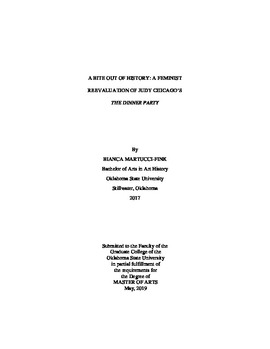| dc.contributor.advisor | Siddons, Louise | |
| dc.contributor.author | Martucci-Fink, Bianca Josephine | |
| dc.date.accessioned | 2019-10-25T20:25:29Z | |
| dc.date.available | 2019-10-25T20:25:29Z | |
| dc.date.issued | 2019-05-01 | |
| dc.identifier.uri | https://hdl.handle.net/11244/321631 | |
| dc.description.abstract | For the purposes of this project, I examine Judy Chicago's monumental work of feminist installation art, The Dinner Party, through a contemporary intersectional feminist lens as a means to resolve the problematic elements found not only within the piece itself, but also within its time and place of creation and its continual preservation as a historic and foundational feminist art object. Questioning our traditional understandings of The Dinner Party, I consider how contemporary intersectional feminist thought and feminist art history can contextualize sometimes problematic works (even if those works are considered to hold feminist understandings) while still recognizing and appreciating their social and historical value. The precise moment in feminist art and history in which the piece was created, has often compromised The Dinner Party's capabilities to evolve and incorporate intersectional approaches. While The Dinner Party undoubtedly has a specific place within the genealogy of feminism, notably situated within the United States' Second-Wave feminist movement, this specific historical and social context has continually reinforced the work to exist and primarily function as the starting place for Western feminist art history. In questioning both the historical and contemporary value of the work, I explore The Dinner Party's missing stories - asking what else the work has to offer because of what and who it misses. What is it about this unwavering historical context that can actually inform a new feminism? I therefore provide three chronological and intersectional-based approaches to the work, looking to the past, present, and future, as a means to resolve the problematic elements within the piece itself and within the art historical canon. Using this feminist framework, I argue that The Dinner Party remains an important point in our feminist art historical past, while at the same time becomes a rich object that actually evolves with us as our contemporary feminist theories progress towards a more equal and inclusive future. | |
| dc.format | application/pdf | |
| dc.language | en_US | |
| dc.rights | Copyright is held by the author who has granted the Oklahoma State University Library the non-exclusive right to share this material in its institutional repository. Contact Digital Library Services at lib-dls@okstate.edu or 405-744-9161 for the permission policy on the use, reproduction or distribution of this material. | |
| dc.title | Bite out of History: A Feminist Reevaluation of Judy Chicago's "The Dinner Party" | |
| dc.contributor.committeeMember | Borland, Jennifer | |
| dc.contributor.committeeMember | Bailey, Lucy E. | |
| osu.filename | MartucciFink_okstate_0664M_16156.pdf | |
| osu.accesstype | Open Access | |
| dc.type.genre | Thesis | |
| dc.type.material | Text | |
| dc.subject.keywords | feminism | |
| dc.subject.keywords | feminist art | |
| dc.subject.keywords | feminist art history | |
| dc.subject.keywords | intersectionality | |
| dc.subject.keywords | judy chicago | |
| dc.subject.keywords | the dinner party | |
| thesis.degree.discipline | Art History | |
| thesis.degree.grantor | Oklahoma State University | |
